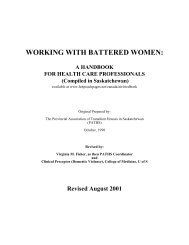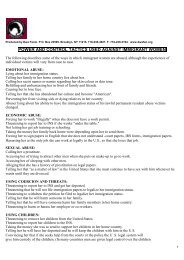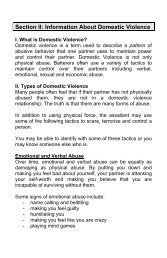Domestic Violence Counseling Manual - Hot Peach Pages
Domestic Violence Counseling Manual - Hot Peach Pages
Domestic Violence Counseling Manual - Hot Peach Pages
You also want an ePaper? Increase the reach of your titles
YUMPU automatically turns print PDFs into web optimized ePapers that Google loves.
GOOD LISTENING SKILLS<br />
• Showing empathy<br />
The counselee may try to downplay or minimize the severity of her situation, but clearly it is<br />
important enough that she is talking to you about it, and this confidence should be taken<br />
seriously.<br />
• Remaining patient and calm<br />
These are difficult and often deeply disturbing issues for the counselee and perhaps you as well.<br />
It is vitally important that you remain tranquil so that the counselee does not have to worry about<br />
you and can instead concentrate on herself. If it takes her awhile to explain the details, don’t get<br />
frustrated— you may be the first person she’s ever told about any of this. It is your responsibility<br />
to maintain self-control.<br />
• Being sincere<br />
Your counselee will be able to tell when you’re being genuine and when you aren’t.<br />
• Asking for clarification<br />
If you are confused about something, ask for clarification as soon as possible, not only does this<br />
help you to understand better, but it also indicates to the counselee that you are listening<br />
• Asking open-ended questions<br />
This prompts the counselee to talk without pressuring her or indicating that she should be feeling<br />
or thinking a certain way. Use words like: when, where, what, who, which, how, and could. Try<br />
to avoid words like: is, are, and do.<br />
• Being okay with silence<br />
Attentively listening to another person’s messages without verbal response leaves responsibility<br />
for problems clearly with the person who “owns” it. Silent pauses allow time for both you and<br />
the counselee to process her thoughts and feelings. Don’t overuse pauses, however, the counselee<br />
did, of course, come to talk.<br />
• Having good body language<br />
Watch your body language! Little things like posture and eye contact can make a big<br />
difference. Feel awkward or unsure if your body language is positive or not A good<br />
posture to take when counseling is sitting squarely with an open posture, while leaning<br />
slightly forward and keeping eye contact. Be careful with your eye contact, however, and<br />
make sure that the woman does not feel threatened, or like you’re staring at her. Also,<br />
remember to ask before you touch. Don’t assume that physical contact, even in the form<br />
of a gentle touch or hug, will be comforting to a victim. Many victims, especially within<br />
50-56

















